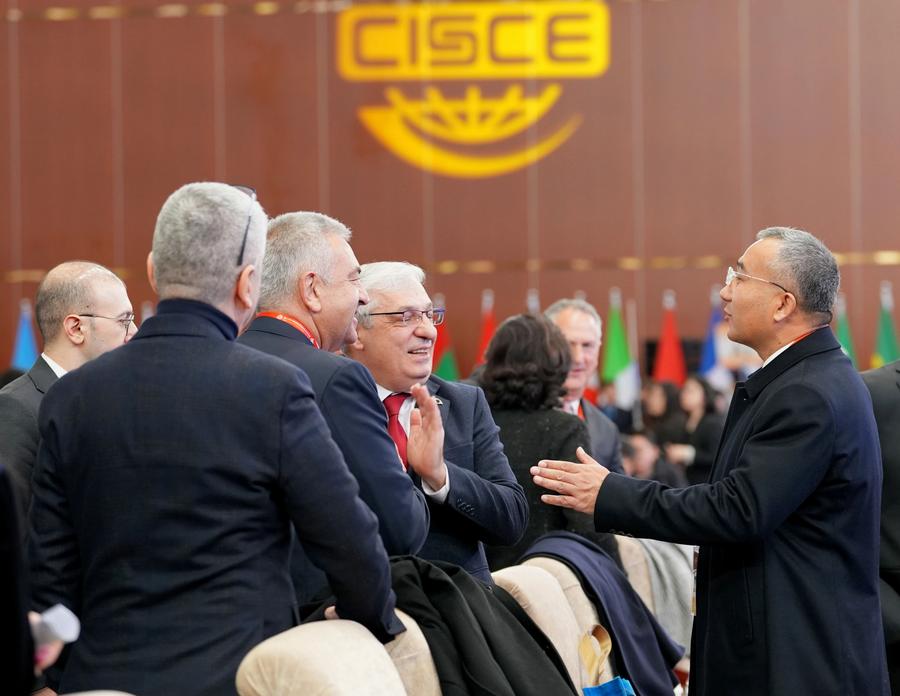
Despite the tension in economic ties between China and the United States, the allure of China's vast market endures as demonstrated at an ongoing expo in Beijing, where some well-known American businesses, such as Apple and Tesla, are making a strong presence.
Apple's booth is bustling at the second China International Supply Chain Expo, which runs from Tuesday to Saturday. The tech giant, attending the expo for the second time, brought along four of its Chinese suppliers to showcase innovations in smart and green manufacturing.
"I am so proud that Apple has an exhibit here with our partners," Apple CEO Tim Cook said on Monday when visiting the booth. Cook has paid three visits to the Chinese mainland this year.
China remains a critical market for Apple. In its fiscal fourth quarter of 2024, Apple's Greater China net sales topped 15 billion U.S. dollars, making it the third-largest market globally after the Americas and Europe.
Beyond Apple, chip producers Qualcomm and Micron, fast-food chain McDonald's, and sportswear giant Nike were among prominent U.S. companies present at the expo.
According to the China Council for the Promotion of International Trade, the organizer of the expo, foreign exhibitors accounted for 32 percent of the total, compared with 26 percent a year earlier, with U.S. companies contributing the largest share.
The high overseas participation underscores the importance of the Chinese market, which is the world's second-largest in consumer goods, and the largest in automobiles and internet. In addition, it also plays a crucial role in sectors from renewable energy to smartphones and chemicals.
The Chinese government has recently rolled out new opening-up measures and taken solid steps to provide high-quality services for foreign-invested enterprises.
China will promote high-standard opening up steadfastly, expand market access further, and welcome more foreign enterprises to engage in industrial cooperation in the country, Premier Li Qiang said Monday while attending a symposium with representatives of enterprises and organizations participating in the expo.
Honeywell, a high-tech manufacturer, is attending the expo for the second consecutive year with its display of advanced technologies in areas like smart manufacturing, energy transformation and aviation.
"We've brought 33 percent more physical exhibits this year, including products and solutions that have been locally developed and manufactured to meet the needs of the Chinese market," said Yu Feng, president of Honeywell China.
The company will sign a memorandum of understanding on strategic cooperation with a Chinese firm at the expo to explore the development of sustainable aviation fuel using green methanol.
Meanwhile, Cargill, a leader in agricultural products that has operated in China for over 50 years, emphasized its commitment to China. "Cargill looks forward to working with more partners and strengthening our connections with the Chinese market," said Cargill China president Guan Huili.
Zhang Jiayin, CEO of McDonald's China, also expressed willingness to leverage the expo as a platform to deepen supply chain partnerships, which will enhance product quality and better serve restaurants and customers.
Despite threats of "decoupling" and "breaking chains" by some Western politicians, the mutual benefits of supply chain cooperation remain clear to U.S. companies.
Electric carmaker Tesla exhibited the Model 3 and Model Y vehicles manufactured in its Shanghai factory at the expo, along with batteries and humanoid robots. With the support of more than 400 Chinese suppliers, Tesla Gigafactory Shanghai contributed over half of Tesla's global deliveries in the first three quarters of 2024.
The supply chain is a core competitive advantage for companies and also highlights the strength of China's industrial system, said Zhang Yihao, president and CEO of GE Healthcare China.
His words followed the October announcement that the company's Beijing factory was added to the World Economic Forum's Global Lighthouse Network -- a high honor for manufacturers pioneering cutting-edge technologies.
This year, GE Healthcare brought nearly 20 key suppliers to the expo to showcase advanced medical equipment like CT scanners and molecular imaging products.
Only through close cooperation, can the supply chains remain stable and efficient and become "win-win chains," Zhang added.